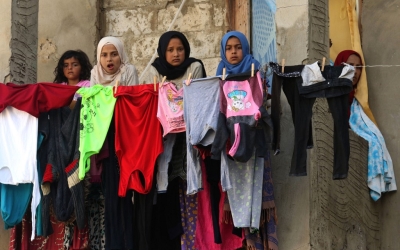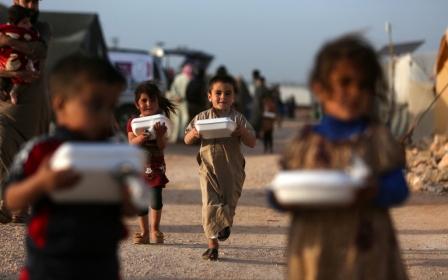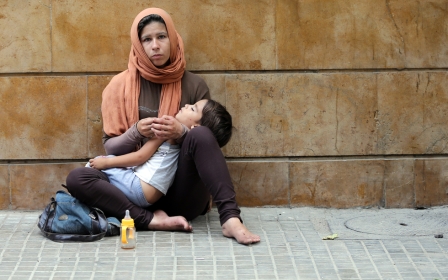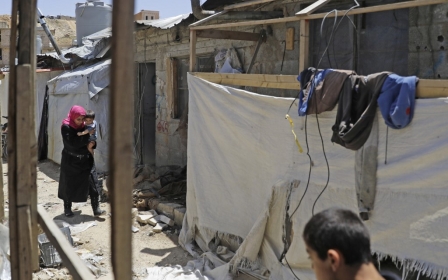Syrian refugees in Lebanon: Beyond the good-versus-evil narrative

It is difficult to write about the forced deportations of Syrian refugees in Lebanon without stepping on one of the numerous landmines forced upon us by a polarised country that oscillates between good and evil.
Since 21 April, the Lebanese army’s intelligence unit has been cracking down on what it says are “undocumented” Syrians, triggering a clear division in the country between those celebrating the deportations and those protesting against them. The arrests have also triggered an intense wave of hate speech against Syrian refugees, which has been strongly denounced by human rights groups.
The campaign appears to be a clear violation of international law, and specifically the principle of “non-refoulement”, which warns against returning anyone to a country where they could face torture or persecution.
Amnesty International has interviewed Syrian refugees who said their deported relatives were not undocumented - as alleged by the Lebanese army - but rather registered with the United Nations High Commissioner for Refugees (UNHCR).
This situation has been manipulated by right-wing and populist politicians, who have scapegoated the refugees by attributing Lebanon’s economic collapse to their presence, instead of taking responsibility for their own failures.
New MEE newsletter: Jerusalem Dispatch
Sign up to get the latest insights and analysis on Israel-Palestine, alongside Turkey Unpacked and other MEE newsletters
Lebanon’s former foreign minister, Gebran Bassil, was among the first to call on Lebanese employers to hire only Lebanese in a Twitter video posted in 2019. In a televised speech earlier this year, Hezbollah secretary general, Hassan Nasrallah, alleged the presence of Syrian refugees in Lebanon to be part of the US economic siege of the country.
Unofficial presidential candidate Sleiman Frangieh went a step further, orchestrating his “campaign” around his intention to deport all refugees. In a televised interview on 26 April, he said he would not accept Syrian refugees remaining in Lebanon, even if Syrian President Bashar al-Assad accepted it. Samir Geagea, the head of the Lebanese Forces party said last week that the presence of the Syrian refugees goes beyond the economic and humanitarian questions and has become an issue of "sovereignty".
Amid rising xenophobia and hate speech against Syrian refugees, this has become a clear-cut case of human rights violations. But beyond the "good and evil" narrative, there are multiple others waiting to be told - narratives that need not fall into the trap of blind accusations or populism.
Adherence to international human rights is one thing, and it is vitally important; but dismissing concerns voiced by citizens about their own country is another, wholly separate issue. In this context, I will highlight five important issues that need to be addressed regarding the issue of Syrian refugees in Lebanon.
Shifting landscape
Firstly, demographic weight matters. The Syrian refugee population in Lebanon remains one of the largest concentrations of refugees per capita in the world. This fact necessitates a crisis-management approach that is not only humanitarian, and not only political at the high level of international relations.
It calls for an approach that does not dismiss valid questions and fears about how the presence of this non-citizen bloc is changing the country’s national identity and social landscape. Of course, it goes without saying that Lebanon is far from having a common national identity; the situation is closer to a mosaic of identities governed by a confessional political system.
Still, one cannot but wonder how the 1.6 million Syrian refugees in the country of six million will affect the existing mosaic. This has to take into consideration urban-rural dynamics given that the majority of Syrian refugees came from rural Syria and the suburbs (Qalamoun, rural Homs, rural Damascus, etc) and religious affiliations since the majority of the Syrian refugees are Sunni Muslims.
While humanitarian aid can drive short-term spending at the local level, it can accelerate the deterioration of an already weak economy
Secondly, we must consider whether we are inflating the positive economic impacts of Syrian refugees. Against the blind scapegoating of this group, an opposing narrative emerged early on, which inflated their positive economic effects.
This analysis was supported by UN agencies, which commissioned consultants to highlight the positive impacts of Syrian refugees on the local economy. In 2015, a UN study argued that for every dollar spent on the humanitarian response, another 50 cents was added to the Lebanese economy, and that a total of 1.6 percent of GDP in losses was almost offset by the economic benefits of humanitarian aid.
The glass-half-full camp, however, has overlooked an important fact: while humanitarian aid can drive short-term spending at the local level, it can accelerate the deterioration of an already weak economy, especially for those who are already vulnerable. In addition, an earlier study by the World Bank in 2013 argued that the impact amounted to minus 2.9 percent of GDP - and that it was pushing 170,000 Lebanese people into poverty.
This shows that different analytical lenses can yield different findings, and the choice of the lens is often linked to the agenda of those who commission these studies and the researchers themselves.
Another example is a 2021 study by the World Refugee and Migration Council, which showed that Syrian refugees had an insignificant impact on labour market outcomes. The study, however, overlooked the fact that Syrian informal employment was competing with informal employment among the Lebanese population.
Reduced job opportunities
Thirdly, there is an issue around the Syrian labour force crowding out the Lebanese. An early assessment by the International Labour Organization in 2014 examined the employment profile of Syrian refugees, and found that they were mainly concentrated in poor and deprived peripheral areas, where competition over job opportunities is an urgent challenge facing the host community.
This employment situation has worsened with the increase in labour supply, the study found, with Syrian workers “accepting lower incomes [and working] for longer hours and without social benefits”. This has led to decreasing wages and a reduction of job opportunities for Lebanese people.
Of course, there are studies that use different models to show that the "Syrian refugees have an insignificant impact on labour market outcomes” such as the recent study by the World Refugee and Migration Council. However, it remains a mystery how looking at the formal economy and formal labour market outcomes (such as the formal unemployment rate in Lebanon) will tell us anything about the informal economy where the majority of Syrian labour and vulnerable Lebanese workers reside.
Additionally, Syrian-owned businesses are selling goods produced in Syria at lower prices, and the costs of basic commodities and services have soared as a result of increased demand.
One can argue that this is a labour market regulation issue, but Lebanon has weak institutions and governance, and this naturally extends to labour market regulation. It’s unimaginable that a situation that has added further stress to the country’s infrastructure and fuelled polarisation would also lead to an improvement in its institutional effectiveness.
Fourthly, there is the issue of dealing with a flow rather than a stock. Lebanon has always been a destination for informal Syrian workers in construction and agriculture. The Syrian-Lebanese border is fluid, and both countries have benefited from employment and cheap labour. But can one remain a refugee if he visits his country a few times a year? This is a valid question, and we haven’t seen enough attempts to answer it calmly.
Lastly, for a generation of Syrians, Lebanon is home. By 2016, there were nearly 500,000 school-aged children registered in Lebanon, of which around half were out of school. This situation is only worsening with the education ministry’s denial of access to education for Syrian children, such as through requesting official documents that many cannot obtain.
In addition to discriminatory practices, the costs of transportation, and the fact that public schools remained closed for the 2022-23 scholastic year as a result of the multi-dimensional crisis, it is clear that the situation will only get worse. This crisis is leaving a refugee population without an education or a future, for whom Lebanon is the only home.
At the same time, a voluntary return to a safe Syria is not on the horizon for various reasons that relate to the dire economy in Syria, the security situation, and the fragmentation of the country.
This crisis is leaving a refugee population without an education or a future, for whom Lebanon is the only home
A report published in 2020 shows that 60 percent of those interviewed from the returnees said that they were considering leaving the "Syrian-regime held areas" due to lack of decent livelihood "as well as lack of security and fear of arrest", indicating that the complexity also relates to the nature of return itself, given the high density of displacement inside Syria and the Syrian government's stand on the return of the refugees.
These five issues deserve to be addressed calmly, rather than dismissed with accusations. This is not to say that one should take a nuanced stance against discrimination. But if the ultimate aim is to protect those who need protection, then repetitive statements, such as “I stand with the refugees”, and extending an open arm to refugees - at all costs - will fail to protect the refugees themselves. At this critical time, we must admit that the situation is complex - and demography does matter.
The views expressed in this article belong to the author and do not necessarily reflect the editorial policy of Middle East Eye.
Middle East Eye delivers independent and unrivalled coverage and analysis of the Middle East, North Africa and beyond. To learn more about republishing this content and the associated fees, please fill out this form. More about MEE can be found here.






